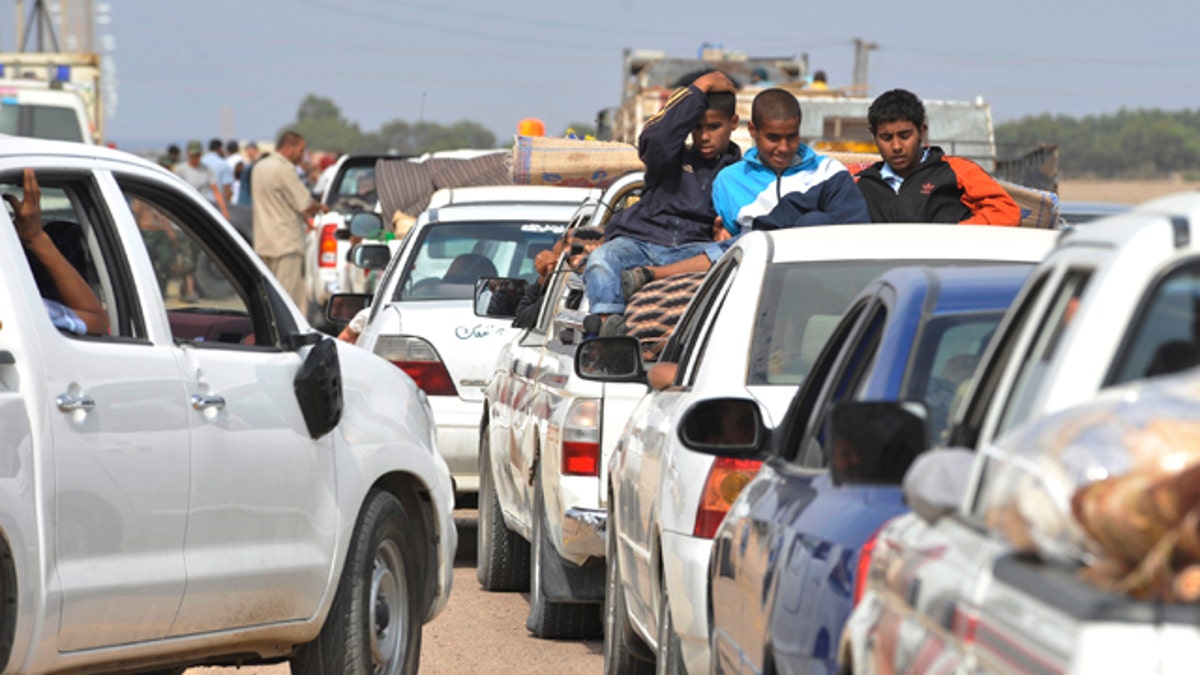
Oct. 2: Internally displaced Libyans flee from the city of Sirte, Libya. Libyan revolutionary fighters stopped battling for the home town of Libya's ousted leader Muammar Qaddafi on Sunday, giving a chance for the civilians to leave the besieged city. (AP)
SIRTE, Libya – Two children and their parents were killed by machine-gun fire while trying to flee Muammar Qaddafi's hometown along with hundreds of other residents, as forces loyal to the ousted regime engaged in heavy clashes with revolutionary fighters surrounding the city.
Their bodies were brought on Saturday to a makeshift hospital outside Sirte, said a doctor there, Nuri Naari. They were hit by machine-gun fire as they drove toward the positions of revolutionary forces on the edges of the city, he said. It was unclear who killed them.
Meanwhile, the top U.S. commander for Africa told The Associated Press on Saturday that the military mission in Libya was largely complete and NATO's involvement could begin to wrap up as soon as next week after allied leaders meet in Brussels.
Sirte is one of the last cities to remain in loyalist hands. After months of stalemate in Libya's civil war, anti-Qaddafi forces swept into the capital in August and their leaders set up a transitional government. But the continued fighting in holdout cities and the failure to find and capture Qaddafi has kept Libya's new leaders from being able to declare victory.
Revolutionary forces had given families inside Sirte two days to leave the city starting Friday, said Mustafa Abdul-Jalil, head of the National Transitional Council that now runs the country. They tried to keep a safe corridor open for civilians fleeing the coastal city.
"This period will give a chance for families to leave the areas of fighting," he said at a press conference Saturday.
Hundreds of cars carrying Sirte residents formed long lines at revolutionary forces' checkpoints leading out of the city, calmly waiting to be checked by the fighters as explosions echoed in the distance.
Also Saturday, the International Committee of the Red Cross sent a team including a doctor into Sirte to deliver medical supplies to a hospital.
In a press statement, the ICRC said there were 200 wounded people at the Ibn Sina hospital, which had shortages of fuel for its generator, as well as body bags and dressing kits.
Because of security conditions the ICRC said the team had to leave before assessing the humanitarian needs of civilians, but was able to speak to Sirte representatives who reported water and food shortages.
"The hospital is facing a huge influx of patients, medical supplies are running out and there is a desperate need for oxygen. On top of that, the water reservoir has been damaged," read the statement.
After weeks of fighting Qaddafi's loyalists inside Sirte, the fighters now hold positions about three miles (five kilometers) from the city center, said commander Mustafa al-Rubaie.
Last week, the Libyan Defense Ministry announced that Sirte's port, airport and military base were all under their control.
Al-Rubaie told The Associated Press that fighters from the east seized control of Sirte's first residential district and a hotel where Qaddafi's snipers were based.
"There is heavy fighting going on in the streets of Sirte right now," he said. "The enemy is besieged from the south, east and west but it's still in possession of highly sophisticated weapons and a large amount of ammunition."
Al-Rubaie said Qaddafi forces were also in control of strategic positions inside the city, including high-rise buildings where snipers are positioned, making the revolutionary forces' advance slow and hard.
"The plan is that the eastern and western forces will meet in the middle of Sirte," al-Rubaie said. "When we reach this point, we will celebrate the liberation of Sirte."
Army Gen. Carter Ham, head of U.S. Africa Command, said that American military leaders were expected to give NATO ministers their assessment of the situation during meetings late next week. And NATO could decide to end the mission even though Qaddafi is still at large and his forces are still entrenched in strongholds such as Sirte and Bani Walid.
NATO played a key role in striking Qaddafi's military forces with an air campaign that began in March under a U.N. mandate to protect civilians.
In Sirte on Saturday, NATO aircraft could be heard circling overhead as fighters on the western approaches to the city fired rockets and tank fire at loyalist positions.
Qaddafi's spokesman Moussa Ibrahim, meanwhile, denied reports that he had been captured, telling the Syrian-based TV station Al-Rai that he was traveling with 23 fighters in Sirte. There was no way to verify the identity of the man speaking in the audio recording, but it sounded like his voice and the TV station has become the mouthpiece for Qaddafi's resistance.
Many of those fleeing Sirte said conditions in the city continue to deteriorate, with food in short supply and no water or electricity.
"We couldn't leave our homes because of the shelling; we had to leave the city," said Ahmed Hussein as his wife, mother-in-law and two children watched the fighters search their car.
Cars, buses and trucks loaded with families and heaped with household goods lined up at the first checkpoint about half a mile from the front lines. Volunteers gave the families food and water while fighters checked documents and cars.
A small contingent from the humanitarian group Doctors Without Borders attempted to enter Sirte on Saturday to deliver medical supplies but turned back because of heavy shelling and no guarantees that the Qaddafi loyalist would hold their fire.
In between the bouts of shooting, Libyan fighters prayed.
